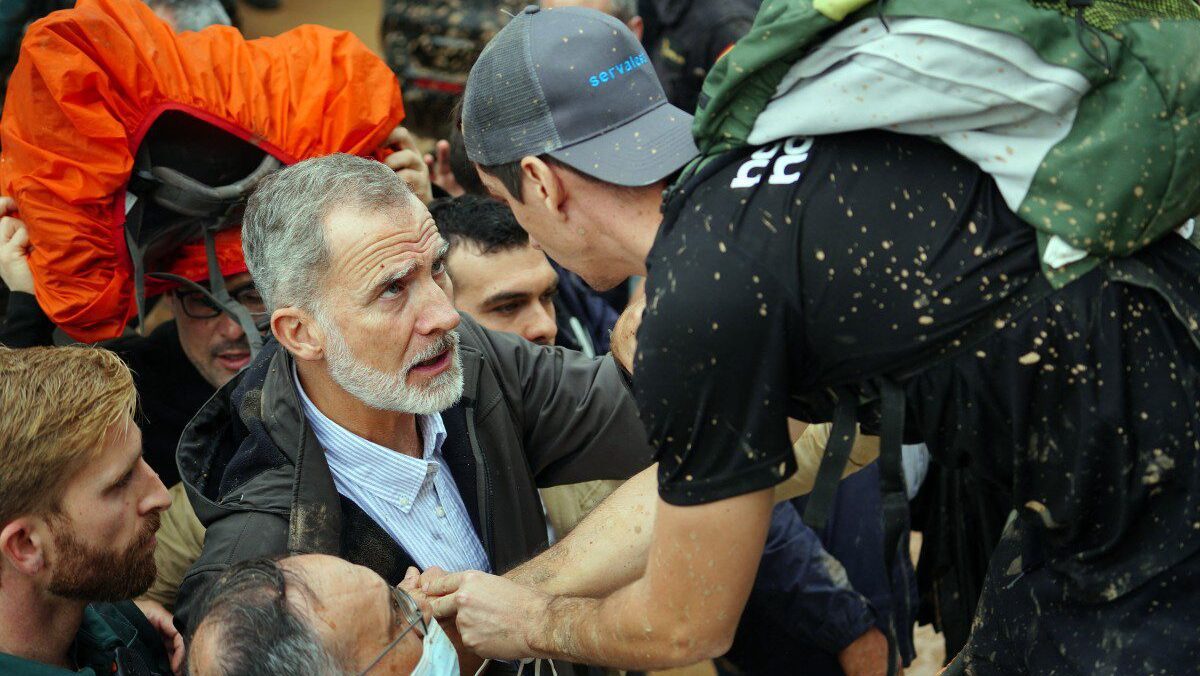
Spanish prime minister Pedro Sánchez, the regional president of Valencia Carlos Mazón, King Felipe VI, and Queen Letizia were greeted with literal mudslinging on Sunday during a visit to Paiporta, one of the small towns most devastated by historic flash flooding last week. The flooding destroyed homes and infrastructure and claimed the lives of over 150 people. That number is still rising as the bodies of hundreds of those still missing are found among the wreckage.
The disaster, caused by a hurricane-like storm, is one of the worst in Spain’s recent history. Criticism has mounted concerning delays by the central government in alerting the public about the dangers of flash flooding, and the slow response of both the local and central governments in the wake of the damage.
When the king and queen and the politicians entered the town together, some residents shouted “murderers,” threw objects and mud at the entourage, and called for the government to step down. One of the queen’s bodyguards was bleeding from his face. Aides opened umbrellas to protect the dignitaries and, while the king insisted on pressing on, Sánchez’s guards quickly removed the prime minister from the scene. King Felipe and Queen Letizia continued to move among the crowd, listening to the complaints of the people who had lost everything and attempting to reassure them that the government authorities were doing all they could in the rescue and clean-up effort.
Los Reyes, durante su visita a Paiporta (Valencia) esta mañana. pic.twitter.com/0OpPm9pAp0
— Casa de S.M. el Rey (@CasaReal) November 3, 2024
One woman did not hesitate to call the queen over to her—to which the queen responded—and tell the consort that she should not have come that day as the visit had halted clean-up efforts for hours. Another told the king, “People have died here, man,” explaining their collective anger, also stating that if they had arrived on the first day and gotten their boots wet in the initial response, people would not be so angry.
“You have to understand the anger and frustration of many people because of how bad they have had it, also because of the difficulty of understanding how all the mechanisms of the state are working and the operability of dealing with the emergency,” Felipe VI said later that day in an appearance at the Emergency Coordination Center.
Sánchez was present again for this part of the visit which took place in a closed space away from the general public.
The king also emphasized “how important it is that people perceive that the mechanisms of the state at different levels are working.”
He also expressed his gratitude for the work of the emergency responders.
“In addition to assisting them in the emergency, we must also give them hope and assure them that the state is present in all its fullness and that each day will get better. I believe so, it is not speculative,” he said.
The king expressed his desire to visit other places hit by the flooding but—for that day at least—decided to postpone the planned visit to the town of Chiva, also at the epicenter of the disaster.
Meanwhile, the government blamed the cold welcome on the “extreme right” and the royal family.
